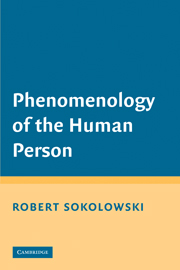Book contents
- Frontmatter
- Contents
- Acknowledgments
- Phenomenology of the Human Person
- Introduction
- PART I THE FORM OF THINKING
- 1 Two Ways of Saying “I”
- 2 Further Kinds of Declaratives
- 3 Linguistic Syntax and Human Reason
- 4 The Person as the Agent of Syntax
- 5 Reason as Public
- 6 Grammatical Signals and Veracity
- PART II THE CONTENT OF THINKING
- PART III THE BODY AND HUMAN ACTION
- PART IV ANCIENTS AND MODERNS
- 19 Conclusion, with Henry James
- Bibliography
- Index
5 - Reason as Public
Quotation
Published online by Cambridge University Press: 05 June 2012
- Frontmatter
- Contents
- Acknowledgments
- Phenomenology of the Human Person
- Introduction
- PART I THE FORM OF THINKING
- 1 Two Ways of Saying “I”
- 2 Further Kinds of Declaratives
- 3 Linguistic Syntax and Human Reason
- 4 The Person as the Agent of Syntax
- 5 Reason as Public
- 6 Grammatical Signals and Veracity
- PART II THE CONTENT OF THINKING
- PART III THE BODY AND HUMAN ACTION
- PART IV ANCIENTS AND MODERNS
- 19 Conclusion, with Henry James
- Bibliography
- Index
Summary
We gain a number of philosophical advantages if we consider syntax as originating in an intersubjective exchange, not in an operation performed by and in a single mind.
Four Benefits of Taking Syntax as Intersubjective
First, we start off with an obvious realism in the use of language. We avoid the egocentric predicament. The very establishment of language occurs between two (or more) speakers, and both speakers are talking about a thing that is presented to them in common. Their speech focuses both of their minds first on the thing as a whole and then on some attribute that they articulate within the thing. It is precisely in this double disclosure carried on between speaker and listener that the thing shows up as a substance: as that which presents itself in and through a feature, and also as that which has an essential structure, something that belongs to it in itself, in contrast with things that belong to it accidentally. The thing shows up, in Aristotle's terms, both as a substrate and as “what it is for this thing to be,” the two central meanings of substance. We will clarify these dimensions of things when we examine the content of speech.
The speakers, therefore, do not operate on their private mental representations, but on the thing they present to one another, the thing they have in common. Mental representations are a deadly trap philosophically: if you start with them, you never get beyond them. They lock us into subjective isolation.
- Type
- Chapter
- Information
- Phenomenology of the Human Person , pp. 68 - 79Publisher: Cambridge University PressPrint publication year: 2008



